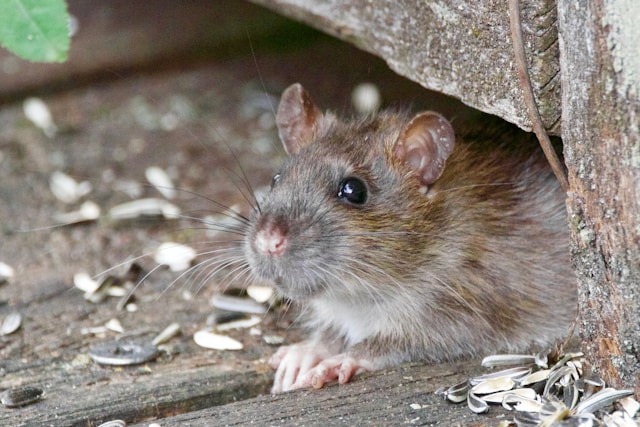Rats scurrying through your home is more than just creepy—it’s a serious health hazard! These pests can carry dangerous diseases like hantavirus and rat bite fever. But you might be asking, “Can rats get rabies, too?” Understanding their disease risks can help you tackle the rodent problem and make sure they stay gone for good!
In this blog, we’ll discuss the threats of rat infestations, offer prevention tips, and provide clear steps to take if you suspect a rat might be rabid. Let’s get to the facts!
Rat Health Risks
So, what makes rats so nerve-wracking? Despite their size, these pests can pack a punch! From hidden viruses to harmful bacteria, here’s a look at the key diseases linked to these pests and why it’s essential to address a rat problem promptly.

Hantavirus
Hantavirus is a severe viral disease that rats can transmit through their droppings, urine, and saliva. When these materials become airborne and you inhale them, they can lead to hantavirus pulmonary syndrome (HPS), which can cause serious respiratory issues and, in extreme cases, be fatal.
The symptoms often start with flu-like signs, including fever, muscle aches, and fatigue, but can quickly escalate to more severe respiratory distress. To reduce the risk of exposure, handle rodent droppings with care and properly ventilate the space when cleaning up infested areas.
Leptospirosis
Leptospirosis is a bacterial infection that can be spread through contact with rat urine. This disease is particularly concerning because symptoms can range from mild flu-like symptoms to a severe illness affecting the liver and kidneys.
The bacteria can enter the body through cuts or abrasions on the skin, so it’s essential to wear protective gloves whenever you clean rat urine or droppings.
Rat-Bite Fever
As the name suggests, rat-bite fever is typically transmitted from rat bites; however, you can get this disease from urine or droppings. Symptoms of rat-bite fever include fever, rash, and joint pain.
If a rodent bites you, we always recommend seeing a doctor. However, once you start experiencing symptoms, you should immediately seek medical attention to manage the infection and prevent complications.
Salmonella and Other Bacteria
Rats can also carry and spread salmonella, a type of bacteria that causes food poisoning. This bacterium can be transmitted through contaminated food, water, or surfaces that have come into contact with rat feces.
Symptoms of salmonella infection include nausea, vomiting, diarrhea, and abdominal cramps. Good hygiene practices are essential to prevent a salmonella infection, including properly storing food, cleaning surfaces thoroughly, and keeping your kitchen and eating areas free from rodent contamination.
Can Rats Get Rabies?
So, can rats get rabies? Let’s set the record straight: It’s very uncommon for rats to contract rabies, but it’s not entirely out of the realm of possibility.
But what is rabies? Rabies is a severe viral infection that attacks the nervous system and is most often spread through the bite of an infected animal.
Wild animals such as bats, raccoons, skunks, and foxes are the primary carriers of rabies. Domestic animals, especially unvaccinated pets, can also become infected and transmit the disease to humans. Rabies is not transmitted through casual contact, such as touching or petting an animal.

Rabies begins with flu-like symptoms: fever, headache, and fatigue. But don’t let these initial signs fool you—things can quickly escalate. As the virus takes over, you’ll see more alarming symptoms like confusion and hallucinations.
One of the most notable features of rabies is hydrophobia, a painful and intense fear of water due to severe throat spasms. As the disease advances, paralysis spreads from the bite site, leading to life-threatening complications like respiratory failure.
Despite the low likelihood of rats having rabies, it’s still important to remain aware of the potential risks. Avoid handling rodents in your home, and if you’re ever bitten, seek immediate medical attention. If you can, catch the rodent without further harming yourself or the pest.
Prevention and Protection
To protect yourself and your family from the diseases rats can spread, follow these key prevention strategies:
- Seal Entry Points: Rats can squeeze through surprisingly small gaps. Inspect your home for potential entry points and seal them with steel wool or caulk to keep these pests out.
- Keep Your Home Tidy: A clean home is less attractive to rats. Store food in sealed containers, clean up spills, and regularly vacuum and sweep to remove crumbs and debris.
- Use Rat Traps and Bait Stations: Set up rat traps and bait stations in areas where you’ve seen rat activity. Place traps along rat trails near their entry points for best results.
- Use Natural Deterrents: Essential oils like peppermint and eucalyptus can repel rats. Soak cotton balls in these oils and place them in areas where rats are active to deter them naturally.
If you’re struggling to manage a rat infestation, it might be time to bring in pest control experts. Professionals have access to powerful products and techniques to address and prevent rat problems effectively.
Whenever you need pest protection against rodents, contact the experts here at proof.!

